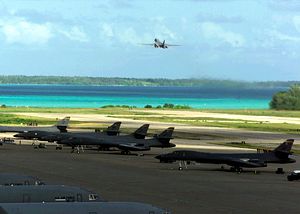In May, the United Kingdom received eviction orders to leave contested islands in the Indian Ocean. The largest of the Chagos Islands, Diego Garcia, hosts a secretive U.S. military base that has played key roles in every U.S. war in the Middle East over the last 40 years. In a diplomatic defeat that media outlets described as “embarrassing,” “humiliating,” “a disgrace and a disaster,” Britain and its U.S. ally were “routed” 116-6 in a UN General Assembly vote that underlined the global isolation of a Brexit-ing Britain and Donald Trump’s United States.
The UN vote affirmed a recent 13-1 verdict at the International Court of Justice (ICJ) in The Hague that found Britain’s rule in the Chagos Archipelago – its last-created colony – “unlawful.” Echoing the International Court, the subsequent UN resolution ordered Britain to “withdraw its colonial administration” within six months and acknowledge that Chagos “forms an integral part” of the victor in the ICJ case: The small western Indian Ocean island nation of Mauritius. The UN “urge[d]” the U.K. “to cooperate with Mauritius in facilitating the resettlement” in Chagos of Mauritians and Chagossians, the indigenous people callously evicted by British and U.S. officials during construction of the base on Diego Garcia.
The only ICJ judge to rule in Britain’s favor was a U.S. justice – an indication that both nations were losers in the case. While Britain claims sovereignty and while the base may be a joint installation technically, it is a U.S. base and de facto U.S. territory at the center of the Indian Ocean.
The ICJ ruling and UN resolution have broader implications for everything from economic competition to military strategy to international law, spanning major powers and small island nations, the Western Pacific to the South Atlantic.
For Britain and the United States, the twin defeats at the UN and ICJ are a blow delivered at a time of rising geopolitical competition in the Indian Ocean and an eastward shift in global power dynamics. The judgments have exposed oft-forgotten, ongoing forms of colonialism (Britain and the United States retain 14 and five colonies, respectively) and provide strong support for complete decolonization and the right to self-determination under international law.
Still, Britain looks set to ignore the eviction orders. “The United Kingdom is not in doubt about our sovereignty,” asserted Pierce. As the UN and ICJ have, as the saying goes, no army to enforce their judgments, the future of the base, control over Chagos, and whether the exiled Chagossians will be able to return home is far from clear.

































